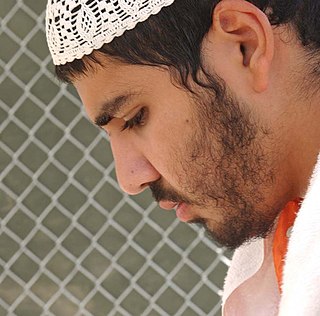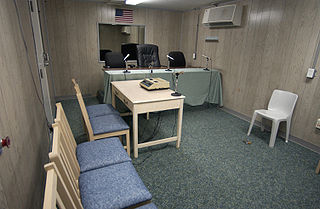
Ibrahim Ahmed Mahmoud al Qosi is a Sudanese citizen and paymaster for al-Qaeda. Qosi was held since January 2002 in extrajudicial detention in the United States Guantanamo Bay detainment camps, in Cuba. His Guantanamo Internment Serial Number is 54.
Rasul v. Bush, 542 U.S. 466 (2004), was a landmark decision of the United States Supreme Court in which the Court held that foreign nationals held in the Guantanamo Bay detention camp could petition federal courts for writs of habeas corpus to review the legality of their detention. The Court's 6–3 judgment on June 28, 2004, reversed a D.C. Circuit decision which had held that the judiciary has no jurisdiction to hear any petitions from foreign nationals held in Guantanamo Bay.
Hamdi v. Rumsfeld, 542 U.S. 507 (2004), is a United States Supreme Court case in which the Court recognized the power of the U.S. government to detain enemy combatants, including U.S. citizens, but ruled that detainees who are U.S. citizens must have the rights of due process, and the ability to challenge their enemy combatant status before an impartial authority.

The United States Court of Appeals for the Armed Forces is an Article I court that exercises worldwide appellate jurisdiction over members of the United States Armed Forces on active duty and other persons subject to the Uniform Code of Military Justice. The court is composed of five civilian judges appointed for 15-year terms by the President of the United States with the advice and consent of the United States Senate. The court reviews decisions from the intermediate appellate courts of the services: the Army Court of Criminal Appeals, the Navy-Marine Corps Court of Criminal Appeals, the Coast Guard Court of Criminal Appeals, and the Air Force Court of Criminal Appeals.

Yaser Esam Hamdi is a former American citizen who was captured in Afghanistan in 2001. The United States government claims that he was fighting with the Taliban against U.S. and Afghan Northern Alliance forces. He was declared an "illegal enemy combatant" by the Bush administration and detained for almost three years without charge. On October 9, 2004, on the condition that he renounce his U.S. citizenship and commit to travel prohibitions and other conditions, the government released him and deported him to Saudi Arabia, where he had been raised.

The Guantanamo military commissions are military tribunals authorized by presidential order, then by the Military Commissions Act of 2006, and currently by the Military Commissions Act of 2009 for prosecuting detainees held in the United States Guantanamo Bay detainment camps.

The Combatant Status Review Tribunals (CSRT) were a set of tribunals for confirming whether detainees held by the United States at the Guantanamo Bay detention camp had been correctly designated as "enemy combatants". The CSRTs were established July 7, 2004 by order of U.S. Deputy Secretary of Defense Paul Wolfowitz after U.S. Supreme Court rulings in Hamdi v. Rumsfeld and Rasul v. Bush and were coordinated through the Office for the Administrative Review of the Detention of Enemy Combatants.
Hamdan v. Rumsfeld, 548 U.S. 557 (2006), is a case in which the Supreme Court of the United States held that military commissions set up by the Bush administration to try detainees at Guantanamo Bay lack "the power to proceed because its structures and procedures violate both the Uniform Code of Military Justice and the four Geneva Conventions signed in 1949." Specifically, the ruling says that Common Article 3 of the Geneva Conventions was violated.

Salim Ahmed Hamdan is a Yemeni man, captured during the invasion of Afghanistan, declared by the United States government to be an illegal enemy combatant and held as a detainee at Guantanamo Bay from 2002 to November 2008. He admits to being Osama bin Laden's personal driver and said he needed the money.

Charles D. Swift is an American attorney and former career Navy officer, who retired in 2007 as a Lieutenant Commander in the Judge Advocate General's Corps. He is most noted for having served as defense counsel for Salim Ahmed Hamdan, a detainee from Yemen who was the first to be charged at Guantanamo Bay; Swift took his case to the US Supreme Court. In 2005 and June 2006, the National Law Journal recognized Swift as one of the top lawyers nationally because of his work on behalf of justice for the detainees.

Neal Kumar Katyal is an American lawyer and academic. He is a partner at Hogan Lovells and the Paul and Patricia Saunders Professor of National Security Law at Georgetown University Law Center. During the Obama administration, Katyal served as Acting Solicitor General of the United States from May 2010 until June 2011. Previously, Katyal served as an attorney in the Solicitor General's office, and as Principal Deputy Solicitor General in the U.S. Justice Department. He is currently a Partner of Chamath Palihapitiya Social+capital Partnership and a member of the board of Social Capital Ventures Inc.

In the United States military, the Army Court of Criminal Appeals (ACCA) is an appellate court that reviews certain court martial convictions of Army personnel.
In United States law, habeas corpus is a recourse challenging the reasons or conditions of a person's confinement under color of law. A petition for habeas corpus is filed with a court that has jurisdiction over the custodian, and if granted, a writ is issued directing the custodian to bring the confined person before the court for examination into those reasons or conditions. The Suspension Clause of the United States Constitution specifically included the English common law procedure in Article One, Section 9, clause 2, which demands that "The privilege of the writ of habeas corpus shall not be suspended, unless when in cases of rebellion or invasion the public safety may require it."

Ali Hamza Ahmad Suliman al Bahlul is a Yemeni citizen who has been held as an enemy combatant since 2002 in the United States Guantanamo Bay detention camp. He boycotted the Guantanamo Military Commissions, arguing that there was no legal basis for the military tribunals to judge him.
Boumediene v. Bush, 553 U.S. 723 (2008), was a writ of habeas corpus submission made in a civilian court of the United States on behalf of Lakhdar Boumediene, a naturalized citizen of Bosnia and Herzegovina, held in military detention by the United States at the Guantanamo Bay detention camps in Cuba. Guantanamo Bay is not formally part of the United States, and under the terms of the 1903 lease between the United States and Cuba, Cuba retained ultimate sovereignty over the territory, while the United States exercises complete jurisdiction and control. The case was consolidated with habeas petition Al Odah v. United States. It challenged the legality of Boumediene's detention at the United States Naval Station military base in Guantanamo Bay, Cuba as well as the constitutionality of the Military Commissions Act of 2006. Oral arguments on the combined cases were heard by the Supreme Court on December 5, 2007.
Al Odah v. United States is a court case filed by the Center for Constitutional Rights and co-counsels challenging the legality of the continued detention as enemy combatants of Guantanamo detainees. It was consolidated with Boumediene v. Bush (2008), which is the lead name of the decision.
The nature of international human rights law has been seemingly altered by Americans since the attacks on New York City and Washington, D.C. on September 11, 2001. The Guantanamo Bay detention camp is one example of recent developments that seem to disregard long standing human rights. The United States of America (USA) has pursued a 'seemingly deliberate strategy' to put suspected terrorists outside the reach of habeas corpus protections. Naval Station Guantanamo Bay serves as the location for a United States military prison in Cuba designed for the detention of non-citizens suspected of terrorist activity. At the time of its creation President Bush stated that its purpose was to respond to serious war crimes, primarily 'a new way to deal with terrorists'. The first camp was set up 3 months after the attacks on the twin towers and since then a human rights debate has begun over the legality of denying detainees the right to petition habeas corpus.
Bismullah v. Gates is a writ of habeas corpus appeal in the United States Justice System, on behalf of Bismullah —an Afghan detainee held by the United States in the Guantanamo Bay detention camps, in Cuba. It was one of over 200 habeas corpus petitions filed on behalf of detainees held in the Guantanamo Bay detention camp in Cuba.
Kennedy v. Louisiana, 554 U.S. 407 (2008), is a landmark decision by the Supreme Court of the United States that held that the Eighth Amendment's Cruel and Unusual Punishments Clause prohibits imposing the death penalty for the rape of a child in cases where the victim did not die and death was not intended.
Scott L. Fenstermaker is an American criminal defense lawyer, based in New York City.









